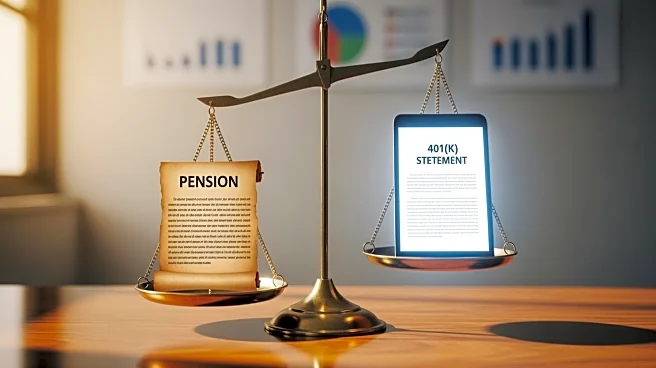What's Happening?
Baby boomers are facing a significant retirement savings gap as they approach retirement age. According to a report by Vanguard, only 40% of workers aged 61 to 65 are financially prepared for retirement,
with the rest expected to fall short. This shortfall is attributed to the shift from a pension-heavy retirement system to a 401(k)-type system during their peak earning years. As a result, many boomers did not fully benefit from either system. The report highlights that the average boomer has $113,000 in home equity, which could be a potential asset to tap into for retirement funding. However, accessing home equity is often seen as a last resort due to emotional attachments and potential costs associated with reverse mortgages or home equity lines of credit.
Why It's Important?
The retirement savings gap among baby boomers could have broader implications for the U.S. economy. If many boomers are ill-prepared for retirement, they may be forced to cut spending, which could negatively impact economic growth. Additionally, the demographic shift known as 'peak 65' is underway, with a record number of people turning 65 annually from 2024 to 2027. This could increase the demand for retirement-related services and support. Financial advisers suggest that working longer or tapping into home equity could help close the retirement-readiness gap, but these options may not be accessible or desirable for all households.
What's Next?
Boomers may need to consider working longer to improve their retirement outcomes. Delaying retirement can increase career-funded savings, higher Social Security income, and reduce the number of years needed to fund retirement. However, not all boomers can work longer due to health issues or layoffs. Additionally, tapping into home equity could be a viable option, but it requires careful consideration of costs and emotional factors. Policymakers and financial institutions may need to address these challenges to support boomers in achieving a secure retirement.
Beyond the Headlines
The shift from pensions to 401(k)s reflects broader changes in the U.S. retirement system, emphasizing individual responsibility for retirement savings. This has led to increased financial insecurity for those who did not adapt to the new system. The emotional attachment to homeownership and reluctance to use home equity as a financial resource highlights cultural values around property ownership and financial independence.










